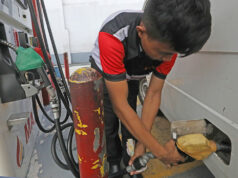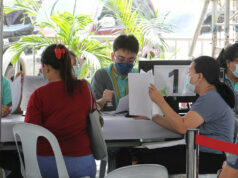Nuclear power plants seen unlikely to be operational by end of Duterte’s term
NUCLEAR POWER within the next two years is unlikely because of the need to complete the appropriate preliminary studies and pass laws regulating the sector, the Senator who chairs that chamber’s energy committee said.
“If you ask me whether nuclear can be part of our energy mix in the next two years, it’s impossible because the study itself will take time and number two, you’ll need legislation to make sure you have safeguards,” Senator Sherwin T. Gatchalian said by telephone Saturday.
Mr. Gatchalian said at least seven measures are needed to develop nuclear power — laws establishing an independent regulator, outline safety standards, ensure nuclear security and manage waste, among others.
“The speed of enacting pieces of legislation on nuclear will depend highly on the quality and the credibility of the study that will be conducted by the DoE (Department of Energy),” he said, noting that the coronavirus pandemic has also delayed the legislative process.
President Rodrigo R. Duterte steps down in less than two years, and policy continuity with the next administration remains unclear.
A measure providing a regulatory framework for nuclear energy development and use nearly hurdled the 17th Congress after securing third-reading approval at the House of Representatives. However, it was still awaiting second reading in the Senate when the session adjourned.
The bill has yet to be refiled in the Senate, while at least six bills relating to nuclear power are now pending at the committee level.
Mr. Duterte issued Executive Order (EO) No.116, authorizing a study on the feasibility of nuclear energy and called for the development of a national policy on nuclear energy.
Mr. Gatchalian has said that the DoE and other government agencies should develop a nuclear program with the “utmost transparency,” considering the risks it poses.
“We plan to conduct a regular oversight hearing… meaning every step of the way the department should clarify and make us understand every inch of nuclear power,” he said.
He added that as the finance committee vice chairman he also will inquire on the progress during budget review.
“My view is we want to give the department elbow room to recommend what type of fuel source and what type of energy source in our country… but there should be some conclusion at one point because we can’t keep on spending on nothing,” he said.
He said the independence of the experts conducting the study will be key, because some experts might be more concerned with selling the Philippines nuclear equipment.
“For example if you ask China to conduct the study, biased na ‘yan (they’ll be biased), because China is trying to be the number one nuclear supplier in the world,” he said.
Carlo A. Arcilla, who leads the Philippine Nuclear Research Institute, said there could still be a significant developments in the last two years of Mr. Duterte’s term.
Mr. Arcilla said the government started “too late” because a version of the EO had been submitted for his signature two years ago.
“Definitely, the nuclear plant will not be finished under President Duterte’s time, but if he agrees with this, construction could still be started,” he said by telephone Sunday. He added that the study is expected to provide an estimate of the costs involved.
“Sabihin natin na maaprubahan ni President Duterte, may kontrata na, mahirap naman basta basta umatras na doon. Sana ‘yung papalit, igagalang ‘yun.” (Assuming President Duterte approves this and signs a contract, it would be difficult to withdraw from such an agreement. I hope the next administration respects that.)
Mr. Arcilla noted that the fastest route to going nuclear would be to rehabilitate the Bataan Nuclear Power Plant, which would take five years
The United Nations’ International Atomic Energy Agency last year transmitted its 19-point Integrated Nuclear Infrastructure Review of the Philippines’ readiness to develop nuclear energy.
The report among others raised the need for more public consultations, a legal and regulatory framework, and the addressing of infrastructure concerns. — Charmaine A. Tadalan



